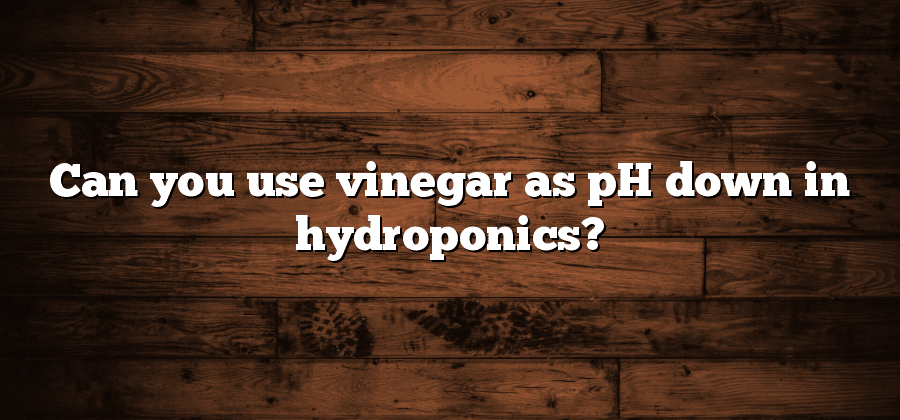What is Vinegar and its pH Level?
Vinegar is a versatile liquid that has been used for centuries in cooking, cleaning, and even medicinal purposes. It is typically made through a fermentation process, where ethanol is converted into acetic acid by the action of bacteria. This acetic acid gives vinegar its distinct sour taste and pungent odor.
When it comes to the pH level, vinegar is considered acidic. The pH scale ranges from 0 to 14, with 0 being the most acidic and 14 being the most alkaline. Vinegar falls within the acidic range, typically having a pH level between 2.4 and 3.4. This acidic nature is what makes vinegar an effective ingredient in various recipes, as well as a natural cleaning agent. Its pH level plays a vital role in enhancing flavors in cooking and preserving food as well.
The Importance of pH in Hydroponics
Hydroponics is a highly efficient method of growing plants without the use of soil. Instead, plants are grown in a nutrient-rich water solution that provides them with everything they need to thrive. However, one key factor that can greatly impact the success of a hydroponic system is the pH level. pH is a measurement of how acidic or alkaline a substance is, and it plays a crucial role in the availability of nutrients to plants.
Maintaining the correct pH level is essential in hydroponics because it directly affects the plant’s ability to absorb nutrients. The ideal pH range for most plants in a hydroponic system is between 5.5 and 6.5. If the pH level deviates from this range, even by a small margin, the plants may experience nutrient deficiencies or toxicities. This can lead to stunted growth, yellowing leaves, and overall poor plant health. It is therefore crucial for hydroponic growers to closely monitor and adjust the pH level of their nutrient solution on a regular basis to ensure optimal nutrient availability and plant growth.
The Role of pH Down in Hydroponics
One crucial aspect of hydroponic gardening is maintaining the appropriate pH level for optimal plant growth. pH down plays a vital role in achieving and maintaining the desired pH level in a hydroponic system. pH down is a solution or substance that is specifically designed to lower the pH of the nutrient solution used in hydroponics. By decreasing the pH level, pH down helps create an environment that is more conducive to nutrient uptake by the plants, promoting their overall health and productivity.
One of the main reasons why pH down is necessary in hydroponics is because the pH of water and nutrient solutions can often be too high for plants to efficiently absorb essential nutrients. Each species of plant has a preferred pH range in which they thrive, and this can vary from crop to crop. pH down allows growers to adjust the pH of the nutrient solution to meet the specific needs of the plants they are cultivating. By using pH down, hydroponic gardeners can ensure that the nutrient solution remains within the ideal pH range, providing plants with an optimal growing environment.
Common pH Down Options in Hydroponics
Acidification of nutrient solutions is a common practice in hydroponics to maintain the optimal pH range for plant growth. pH down solutions are specifically designed to lower the pH level of the nutrient solution and ensure that it stays within the desired range. In hydroponics, there are several pH down options available that offer varying methods of acidification.
One commonly used pH down option is phosphoric acid. Phosphoric acid is a strong acid that effectively lowers the pH level of the nutrient solution. It is readily available and easy to use, making it a popular choice among hydroponic growers. Another commonly used option is citric acid. Citric acid is a natural acid found in citrus fruits and is considered safer and more environmentally friendly compared to other acids. It performs well in gently reducing the pH level without causing any adverse effects on plants.
Understanding the pH Level in Hydroponics
Hydroponics is an innovative method of growing plants without soil, where water is the main medium for providing essential nutrients. In this system, maintaining the correct pH level is crucial for the plants’ overall success and productivity.
pH, short for “potential of hydrogen,” is a measurement of the acidity or alkalinity of a solution. The pH scale ranges from 0 to 14, with 7 being neutral. In hydroponics, however, the optimal pH range for most plants is slightly acidic, typically between 5.5 and 6.5. This pH level ensures that the essential nutrients in the hydroponic solution are readily available for absorption by the plants’ root systems. Beyond this range, nutrient availability can be limited, leading to stunted growth and nutrient deficiencies. Understanding and managing the pH level in hydroponics is thus fundamental to creating and maintaining a thriving system.






